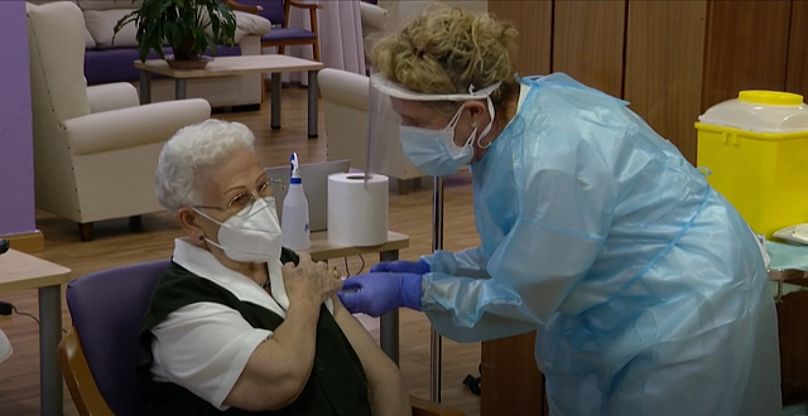Spain is one of the countries affected by the issue, which Health Minister Salvador Illa said has since been resolved and will see the vaccine on the road today.
Deliveries of the Pfizer/BioNTech coronavirus vaccine have been delayed to eight European countries after a logistical problem surrounding the temperature the doses are kept at, according to Spanish authorities.
 ADVERTISEMENT
ADVERTISEMENT
 ADVERTISEMENT
ADVERTISEMENT
The country's health ministry said it had received a message from Pfizer's manufacturing plant in Puurs, Belgium, on Sunday night, saying the delivery would arrive on Tuesday instead of Monday due to "a problem in the loading and shipping process related to temperature control".
It added that eight European countries, including Spain, had been affected - but did not elaborate.
Local authorities in Germany also reported delays in administering the jabs on Sunday after it was found there may have been temperature issues during transit.
In a statement sent to Euronews, Pfizer said: "Due to a minor logistical issue, we have rescheduled a limited number of our deliveries. The logistical matter has been resolved and those deliveries are now being dispatched.
"There are no manufacturing issues to report".
Delivery can be complicated for the Pfizer-BioNTech vaccine because it needs to be stored at very low temperatures of about minus 70 degrees Celsius. What makes it marginally easier to ship is the fact that the vaccine is stable at temperatures between 2 and 8 degrees Celsius (35.6 to 46.4 F) - normal refrigerator levels - for a few days, meaning it can be stored locally.
Speaking to SER on Monday morning, Spanish Health Minister Salvador Illa assured the delivery issue had been solved and that the vaccines "should be on the road today".
It will then be available from Tuesday at dozens of vaccination centres across the country, he said.
"Yesterday [Sunday] late in the afternoon, we were informed of a logistical incident, and that the delivery was delayed until tomorrow, Tuesday. It seems that it is due to an excess of cargo and that it has already been resolved. They should be on the road today. The information is that the doses that were planned will arrive," Illa said.
"The temperature must be monitored very carefully," he added.
The delay in delivery did not impact the start of the rollout of the vaccination programme on Sunday, according to the minister.
"In Spain, I am not aware of any problem with the vaccination that began yesterday. I am not aware of any unforeseen events," he said.
"Yesterday everything worked as planned. Everything worked correctly. The doses were administered. A glimmer of hope was opened up".
Europe began its mass vaccination campaign over the weekend, with Germany, Hungary and Slovakia starting Saturday - a day before the European Commission had initially planned.
Italy, Austria, France, the Czech Republic and others followed suit on Sunday in widely-reported moments for each nation.
In Spain, 96-year-old Araceli Hidalgo was the first person to receive the jab alongside a nurse at a care home in Guadalajara.
The injections were the first of 350,000 Pfizer-BioNTech doses expected to be administered every week across Spain in the next three months.
With two doses necessary for each person, this timeline would mean just over 2 million people would be vaccinated by spring.
"We are starting to turn the page on a difficult year," European Commission President Ursula von der Leyen said on Boxing Day of the whole bloc.
"Our European Vaccination Days are a touching moment of unity. And a European success story.
"Very soon we will have more vaccines once they are proven to be safe and effective.
"The European Union has secured enough doses of vaccines for our whole population of 450 million people".
Up to 300 million doses of the Pfizer-BioNTech vaccine have been secured by the EU through an Advanced Purchase Agreement, with hopes that two-thirds will have been administered by September 2021.
Similar deals have also been made with Sanofi-GlaxoSmithKline, AstraZeneca, Janssen Pharmaceutica NV, CureVac and Moderna.
The European Medicines Agency is set to decide on whether to approve the Moderna vaccine on January 6.











